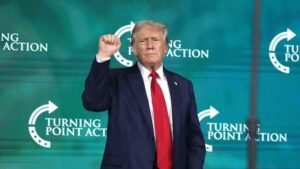
REUTERS/Isaiah J. Downing
A wave of businesses across the United States is gearing up for significant price increases should former President Donald Trump reclaim the White House in 2025. According to a report by the Washington Post, companies relying on foreign suppliers for essential goods such as baby products, auto parts, and clothing are warning that the only way to absorb Trump’s anticipated tariffs on imports will be to pass the costs onto consumers.
“We’re set to raise prices,” stated Timothy Boyle, CEO of Columbia Sportswear, emphasizing the challenges ahead. “It’s going to be very, very difficult to keep products affordable for Americans.” The potential impact of these price hikes comes as Trump has pledged to impose tariffs that could be the highest seen since the 1930s, with proposed rates reaching up to 60 percent on goods imported from China.
Despite Trump’s assertions that foreign companies would bear the brunt of these tariffs, the reality is that the U.S. Customs and Border Protection agency mandates that American importers pay tariffs when products enter the country. This means that the financial burden will ultimately fall on U.S. consumers, contradicting Trump’s claims. The Washington Post reports that investors in AutoZone, a retailer sourcing auto parts from countries including China, India, and Germany, were informed this month that consumers would be expected to shoulder the price increases due to tariffs.
“We know what the tariffs will be,” said Philip Daniele, CEO of AutoZone. “We generally raise prices ahead of that.” This sentiment reflects a broader trend among businesses that are already anticipating the economic repercussions of Trump’s proposed tariffs.

Adding to the economic analysis, a study from the nonpartisan Budget Lab at Yale University debunks the notion that foreign entities will bear the financial impact of these tariffs. “A consistent theoretical and empirical finding in economics is that domestic consumers and domestic firms bear the burden of a tariff, not the foreign country,” the study stated, reinforcing concerns about the anticipated financial strain on American consumers.
In line with this, Stanley Black & Decker CEO Donald Allan revealed during an investor meeting this year that the company would likely address the anticipated tariffs with “some surgical price actions.” This indicates a trend among major corporations to strategically raise prices to mitigate the effects of increased tariffs.
As businesses brace for these potential price hikes, consumers may face a challenging economic landscape if Trump returns to power. The implications of such tariff policies raise important questions about affordability and access to essential goods in the United States. With many companies publicly stating their intent to increase prices, consumers will need to prepare for possible changes in their purchasing power and the cost of everyday items.
In summary, as Trump’s return to the White House looms as a possibility, businesses are taking proactive measures to protect their bottom lines. This proactive stance raises significant concerns about the economic implications for everyday Americans, emphasizing the need for careful consideration of tariff policies and their potential impact on consumers.


